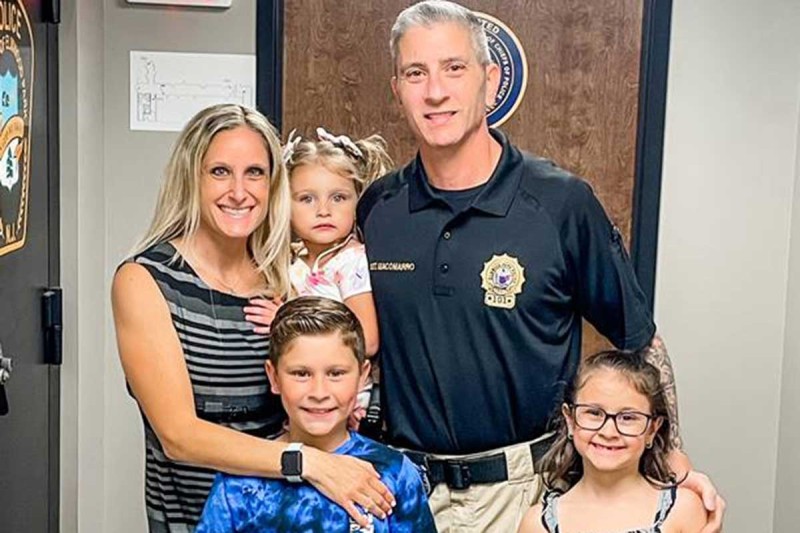
Detective Shad Giacomarro — pictured with wife, Katie, and children (clockwise from top left) Emilia, Malayna, and Brayden — was able to receive a reduced dose of radiation for tonsil cancer, thanks to an innovative clinical trial at Memorial Sloan Kettering Cancer Center.
A revolutionary radiation treatment is dramatically improving the quality of life for some people with HPV-positive head and neck cancers, like New Jersey police officer Shad Giacomarro, 49.
Researchers at Memorial Sloan Kettering Cancer Center (MSK) have developed a therapy using less than half the standard radiation dose for some people with HPV-positive throat cancer and other head and neck cancers. This new treatment offers an equally good prognosis for patients like Shad, but they have less discomfort and fewer complications.
In February 2021, the father of five was diagnosed with early-stage HPV-positive tonsil cancer, a type of throat cancer, after finding a lump in his neck while shaving. His family and friends rallied around him and urged him to go to MSK. “It wasn’t even a question,” says Shad’s wife, Katie.
Head and neck cancers related to human papillomavirus (HPV) infection have surged in recent years, especially in men. These types of cancer, sometimes grouped together as oropharyngeal cancer, usually respond well to a combination of surgery, radiation, and chemotherapy.
Even though the survival rate for HPV-positive head and neck cancers is close to 90%, chemotherapy and radiation can cause serious side effects.. After Shad had surgery to remove the tumor from his throat, he faced radiation and chemotherapy. He was dreading mouth sores, difficulty swallowing, dry mouth, changes in taste, and nausea, and he braced for the possibility of having to miss work.
But his MSK radiation oncologist, Linda Chen, told him about a clinical trial that reduced the amount of radiation for certain HPV-positive head and neck cancers. It was pioneered by radiation oncologist Nancy Lee, MSK’s Vice Chair of the Department of Radiation Oncology, Service Chief of Head & Neck Radiation Oncology, and Service Chief of Proton Therapy at MSK.
The innovative treatment not only cut the radiation dosage by more than half but also shortened chemotherapy cycles from three to two.
“It was exciting to offer Shad this option,” Dr. Chen says, “because the reduced radiation dose makes a huge difference in both short-term and long-term side effects.”
Receiving less chemotherapy also makes treatment easier for patients. “Anytime we can safely reduce the amount of chemotherapy someone needs, we go for it,” says Shad’s head and neck oncologist, Anuja Kriplani. “I always tell patients that I not only want them to be cancer free but also to have a good quality of life after all of this is done.”
How Does MSK Reduce Radiation and Chemotherapy for Head and Neck Cancer?
Radiation dosage is measured in units called grays (Gy). After the patient has surgery, the standard approach for head and neck cancer has been 70 Gy of radiation over seven weeks, along with three cycles of chemotherapy. The new regimen pioneered by Dr. Lee reduces the dosage to 30 Gy given over three weeks, along with only two cycles of chemotherapy. Dr. Lee had read about this method working in people with anal cancer and hypothesized that it would also work for certain head and neck cancers.
“We’ve dramatically reduced the treatment and are getting the same results to eradicate the cancer,” she says. “We’ve seen a dramatic reduction in side effects. And we’re saving patients the hassle of having to come in every day. They can get back doing the things they love. This is an absolute game changer for treating HPV-positive cancer.”

Nancy Lee
At first, Shad was concerned the lower dose might not be as effective in wiping out his cancer, but he says he trusted his MSK doctors. “I knew joining a clinical trial was going to help other people,” he says. “And I was confident because my team was confident.” He appreciated that he could be treated at MSK Bergen near his home in New Jersey. It was also convenient for having regular scans to check for any signs the tumor was coming back.
Shad did experience some side effects from the lower-dose radiation; the most severe were dry mouth and loss of taste. He and Katie found that smoothies made eating easier. Two months after finishing treatment in May 2021, Shad was back to eating normally. He has some lingering changes in taste but found a solution: “I put hot sauce on everything,” he says with a laugh.
Shad has been disease-free for one year, and his prognosis is excellent. He never missed any work on the police force. His doctors do not expect the tonsil cancer to come back.
“It is very rewarding to see how well he is doing now,” says Dr. Chen.
Making Reduced Radiation and Chemotherapy Available to More People
When the clinical trial started, not all people with HPV-related head and neck cancer were eligible. But because of the strong results so far, Dr. Lee and her team are expanding the trial’s next phase to include HPV-related tumors bigger than Shad’s, as well as HPV-related tumors that are node-negative (haven’t spread to a person’s lymph nodes). The goal is to make 80% to 85% of people diagnosed with HPV-related head and neck cancers candidates for lower-dose therapy.
“We anticipate the same outcome given that the results so far have been excellent,” says Dr. Lee. In the future, she hopes to expand the trial to even more people, including those with very early and advanced cancers.
To learn more about these clinical trials, email Dr. Lee at [email protected].
Using Proton Therapy for HPV-Related Head and Neck Cancer
The ongoing clinical trial will also include proton therapy as an option. Proton therapy is an advanced form of radiation therapy using protons rather than X-rays to treat cancer. Proton therapy enables doctors to direct cancer-fighting energy to precise locations within the body. MSK radiation oncologists now deliver proton therapy at a new state-of-the-art facility, the New York Proton Center, in upper Manhattan.
“There is a lot of interest in proton therapy — we had a patient come to MSK from Las Vegas for treatment because we are offering the 30 Gy dose that way,” Dr. Lee says.
The Next Step: Eliminating Surgery or Radiation Altogether
The latest clinical trial also is investigating whether surgery can be completely avoided for HPV-related head and neck cancer. A group of 150 patients will receive chemotherapy and the low-dose radiation, and surgery will be optional.
Researchers are also studying whether some patients who have surgery and afterward appear disease-free can safely skip radiation. Doctors will assess each patient’s risk based on their tumor’s pathology and a new biomarker test that indicates whether cancer cells are circulating in the blood. Patients will be closely monitored, with regular blood checks and imaging scans. If the biomarker starts to rise, the patient will begin radiation.
“We think selecting patients carefully for this approach will allow them to remain free of disease while being entirely spared from side effects of radiation,” says Dr. Chen, who is leading the trial along with head and neck surgeon Marc Cohen.
Adds Dr. Lee: “We hope that in the future, many people with HPV-positive throat cancer will be able to receive an even less invasive, less intense, and more precise treatment.”
As for Shad, he is grateful to have avoided the harshest side effects of treatment. As he puts cancer behind him, he’s looking for ways to pay it forward, like talking to people who are newly diagnosed.
“I’m here for them,” he says. “I’d tell them to call me, no matter day or night, and reassure them that if I can do it, they can do it too.”
This story was originally published in 2017 and has been updated with new information.





